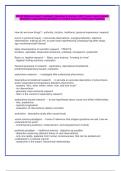SW650 Midterm Exam {Combined} | Questions & Answers (100 %Score) Latest Updated
2024/2025 Comprehensive Questions A+ Graded Answers | With Expert Solutions
How do we know things? - authority, intuition, traditional, personal experience, research
errors in personal inquiry - inaccurate observations, overgeneralization, selective
observations, making up info, ex post facto hypothesizing (changing hyp after study),
ego involvement/self-interest
Ideal characteristics of scientific research - TROUTS
tentative, replicable, observation/empirical, unbiased, transparent, systematic
Basic vs. Applied research - - Basic: pure science, "knowing to know"
- Applied: finding solutions, evaluation
General purposes of research - exploratory, descriptive/correlational,
predictive/explanatory/causal, evaluation
exploratory research - - investigate little understood phenomena
Descriptive/correlational research - - to provide an accurate description of phenomena
and/or associations/comparisons between phenomena
- answers "who, what, where, when, how, and how much"
- no interventions
- generally cross-sectional research
- often in the context of exploratory research
explanatory/causal research - - to test hypotheses about cause and effect relationships
- why, predictions
- typically longitudinal
- evaluation of interventions (before and after)
evaluation - descriptive study after causal study
social science paradigms - - frame of reference that shapes questions we ask, how we
understand the world
- contemporary positivism, interpretivism, and empowerment (critical)
positivist paradigm - - traditional science - objective as possible
- deductive reasoning (abstract theory to real observations)
- only one reality, separate from human consciousness, that can be studied and
understood in a rational manner
- researcher is the expert, hierarchical relationships
, interpretivist paradigm - - reality is a product of consciousness/interpretation = multiple
realities
- no "one true knowledge"
- inductive reasoning (observations to construct theory)
- individuals are experts on own realities
empowerment/critical paradigm - - feminist, marxist, critical race, anticolonial
- challenges existing ways research is conducted, questions how questions are asked
- promotes social justice
Models of Causal explanation - nomothetic and idiographic
Nomothetic - - investigating large groups of people to find general principles that apply
to everyone
- human behavior is a complex combo of many factors and therefore it is best to study
people on a large scale
- quantitative and experimental methods are best to ID universal laws governing
behavior
- advantages: useful for predicting and controlling behavior
- disadvantages: superficial understanding, not informative of individuals
idiographic - - investigating individuals in in-depth detail to achieve unique
understanding
- humans are unique and therefore general laws are not applicable
- qualitative methods provide more complete and global understanding of an individual
using flexible and detailed procedures
- advantages: more complete understanding of an individual
- disadvantages: difficult to generalize or replicate
modes of inquiry: quantitative - - observations translated into numbers
- hypothesis testing
- nomothetic aims - describe objective reality
- methods: concepts operationalized, hypotheses tested and validated with stats
- designs: cross-sectional or longitudinal, surveys/interviews/records/etc
modes of inquiry: qualitative - - data include words, observations, themes, interactions
- flexible and open-ended questions-
- focus on participant's experiences
- idiographic aims - subjective, viewpoint of participant
- methods: theories validated through logic and detailed observations
- design: cross-sectional or longitudinal, participant observation, interviews, personal
accounts
modes of inquiry: mixed methods approaches - - both quantitative and qualitative -
strengthen studies, fill in gaps




